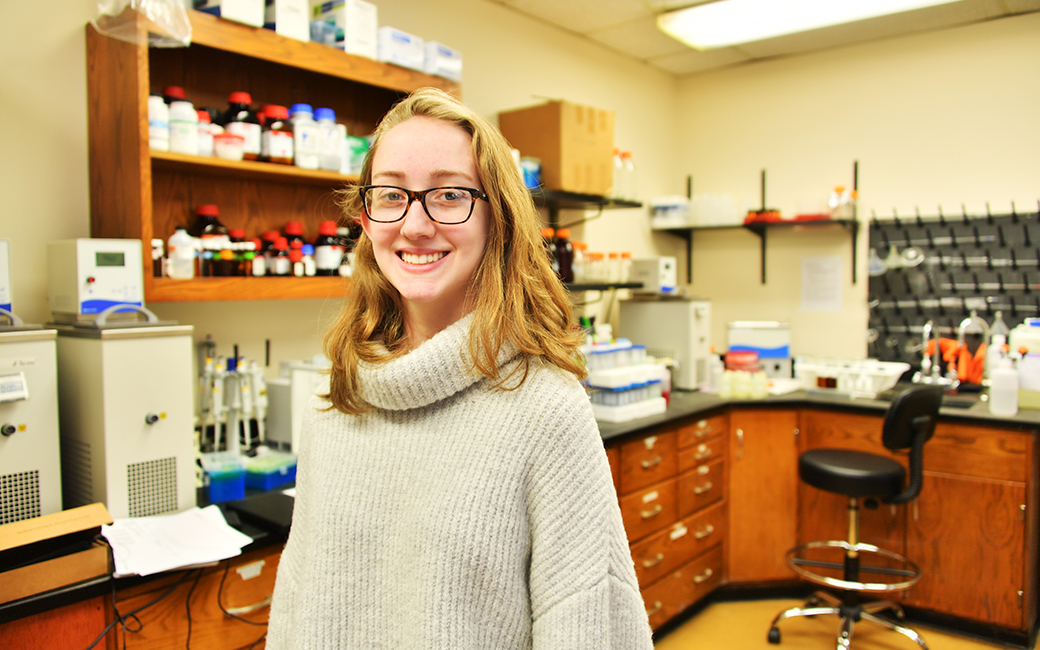Chemistry major wins recognition, grant money for graduate research from NSF
Marella Schammel, a chemistry major who has already won national recognition for her undergraduate research, won a grant that will support her as she works toward a Ph.D.
By Cody Boteler on April 15, 2020

Marella Schammel ’20, a Towson University chemistry major, received a 2020 National Science Foundation (NSF) Graduate Research Fellowship, adding a second national honor to her flourishing research career before she even graduates.
She joins the elite ranks of grant recipients, which includes 42 Nobel laureates and more than 450 members of the National Academy of Sciences. About 500,000 people have applied and just 50,000 have been awarded the fellowship since 1952.
This fall, Schammel will attend the University of Southern California to pursue her doctorate and continue a promising research career.
“I love it [research],” Schammel says. “I’m so glad that I stumbled into it.”
The Honors College student says her time at TU helped her step into the role of a researcher, in part because of how much the university concentrates on its undergraduate students.
“Towson is unique in that we don’t have a graduate program in chemistry, so all the focus is on undergraduates,” she says.
This is likely the first time a TU student has earned a place in the NSF’s research fellowship program, says Clare Muhoro, chemistry professor and director of competitive fellowships and awards in the Office of the Provost. She says she is not aware of any winners at Towson University in the 15 years that she has been here.
Muhoro credits Towson University’s status as a predominantly undergraduate institution with facilities large enough to offer faculty and students state-of-the-art equipment.
“That’s what makes the research opportunities unique,” Muhoro says.
The NSF award comes with a three-year, annual stipend of $34,000 plus a $12,000 cost-of-education allowance. Schammel says she is grateful for the funding because it will allow her to focus solely on her research at USC.
“ I love being in the lab, at the bench doing chemistry. I think research is where I want to end up. ”
Schammel has already co-authored two publications, a rarity for undergraduate students. Last year, she won the prestigious Goldwater Scholarship, chosen from a pool of more than 5,000 applicants from 443 institutions across the country. She was also associate professor John Sivey’s first research lab manager.
“Marella has such a zeal for research, which will serve her well in her Ph.D. studies that begin next year,” Sivey says. “In my experience, undergraduates who perform chemistry research at TU achieve a level of scholarly growth more typical of a graduate research student at many other institutions.”
Schammel, who researched chemical byproducts produced while disinfecting drinking water, says she will study environmental engineering as a doctoral candidate. At USC she will turn her attention to wastewater treatments.
“I love being in the lab, at the bench doing chemistry. I think research is where I want to end up,” she says.
In addition to her research, Schammel has mentored other students, presented her findings to alumni and parents and been involved in the Undergraduate Research Club.
“She’s awesome. She’s a rockstar,” says Rhiannon Napoli Clements, director of co-curricular programs and constituent relationships for the Honors College.
Sivey, Schammel’s research mentor, says that seeing his students succeed reminds him of why he entered academic research.
“For me, it is all about maximizing opportunities for students and helping them to catapult to higher levels of achievement,” he says.